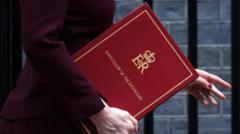Should We Abolish the Treasury? A Labour Peer Weighs In

Published: 2025-09-28 17:00:26 | Category: sport
Labour peer Maurice Glasman has called for the abolition of the Treasury, advocating for a shift in government focus towards industrial revival as a means to radically reshape the British economy. His remarks, made during Labour's conference in Liverpool, reflect a growing sentiment within the party for economic radicalism and a reconsideration of traditional fiscal structures.
Last updated: 05 October 2023 (BST)
Key Takeaways
- Lord Glasman advocates abolishing the Treasury to enhance industrial strategy.
- He suggests reallocating Treasury powers to the Prime Minister and creating a new economics ministry.
- The call for vocational education reform highlights a shift towards practical skills over traditional academic paths.
- Labour MP Jonathan Hinder supports Glasman's vision, linking it with broader electoral strategies.
- Chancellor Rachel Reeves prioritises economic stability, facing pressure from within her party regarding spending cuts.
The Case for Abolishing the Treasury
At the forefront of Glasman's argument is the assertion that the current structure of the Treasury is a hindrance to a robust industrial strategy. He criticises it as being staffed largely by individuals with backgrounds in politics, philosophy, and economics (PPE), whom he believes lack a practical understanding of work and vocation. By proposing the abolition of the Treasury, Glasman is essentially advocating for a complete overhaul of how the UK approaches economic policy.
Rethinking Economic Structures
Glasman's vision extends beyond simply dissolving the Treasury. He proposes that its powers be transferred to the Prime Minister, allowing for more direct control over economic policies. Additionally, he suggests the establishment of a dedicated economics ministry that would focus on implementing a new industrial strategy aimed at revitalising heavy industry and vocational jobs.
His call for vocational education reform is particularly noteworthy. Glasman recommends closing half of the UK's universities and transforming them into vocational colleges. This radical idea aims to prioritise skill acquisition over traditional academic pathways, aligning educational outcomes more closely with the needs of the economy.
Industrial Revival and the Future of Work
Glasman’s emphasis on heavy industry speaks to a broader concern regarding the future of work in an age increasingly dominated by artificial intelligence (AI). He argues that many white-collar roles, particularly those in finance and accounting, may become obsolete as technology advances. By focusing on industrial revival, Glasman believes that the UK can create new jobs that honour the dignity of labour and skilled work.
Labour's Economic Radicalism and Its Political Context
Alongside Glasman, Labour MP Jonathan Hinder expressed strong support for the Blue Labour movement, which promotes a left-wing economic alternative that resonates with voters disillusioned by traditional party lines. Hinder’s remarks underscore a critical moment for the Labour Party, as it grapples with its identity and electoral strategy amidst the rise of Reform UK, a party appealing to former Labour voters who feel abandoned by the mainstream.
The Appeal of Blue Labour
Blue Labour seeks to merge blue-collar values with left-wing economic policies, positioning itself as a voice for working-class concerns, particularly on issues like immigration and crime. Hinder noted that this approach could potentially attract voters from Reform UK, suggesting a strategic pivot that aims to reclaim lost ground without sacrificing core Labour principles. This realignment reflects a growing recognition within the party that economic radicalism may be necessary to remain relevant in today's political landscape.
Challenges Facing Labour's Economic Strategy
Despite the enthusiasm from Glasman and Hinder, the reality is that the current Chancellor, Rachel Reeves, is focused on economic stability. As she prepares to deliver her second autumn Budget, Reeves has emphasised her commitment to non-negotiable borrowing rules aimed at maintaining fiscal discipline. This approach has drawn criticism from within her party, particularly regarding welfare spending, highlighting a tension between traditional economic caution and the push for more radical reform.
The Broader Economic Landscape
The UK economy is currently under significant strain, with rising borrowing costs and anticipated tax increases placing additional pressure on fiscal policy. As Glasman's ideas gain traction, there is a possibility that Labour's leadership may need to navigate a delicate balance between maintaining economic stability and embracing a more radical economic strategy that could appeal to a broader electorate.
What Lies Ahead for Labour?
While Lord Glasman’s proposals may face significant hurdles in implementation, they highlight a critical debate within the Labour Party regarding its future direction. With the rise of alternative political movements, the traditional left must reconsider its approaches to economic policy and voter engagement. The question remains whether Labour can adapt its strategies sufficiently to resonate with a changing electorate.
Conclusion
As the Labour Party navigates its internal debates and the external political landscape, the discussions initiated by figures like Maurice Glasman and Jonathan Hinder will likely shape future economic policies. The push for industrial revival and vocational education reform reflects a desire for a more responsive and relevant Labour Party. How these ideas will be integrated into the party's broader strategy remains to be seen, but they signify a notable shift in the conversation around economic policy in the UK.
What will be the implications of these radical ideas for Labour’s electoral prospects? Only time will tell. #LabourParty #EconomicReform #BlueLabour
FAQs
What is Blue Labour?
Blue Labour is a movement within the Labour Party that promotes blue-collar values and left-wing economic policies, aiming to reconnect with working-class voters.
What are the main proposals from Lord Glasman?
Lord Glasman proposes abolishing the Treasury and creating a new economics ministry, alongside transforming universities into vocational colleges to focus on practical skills.
How does Glasman's vision relate to current economic challenges?
Glasman's vision addresses the need for industrial revival in the face of rising AI technology and economic pressures, advocating for a more ambitious industrial strategy.
What is the role of Rachel Reeves in this discussion?
Chancellor Rachel Reeves prioritises economic stability and has faced criticism for her adherence to strict borrowing rules while trying to accommodate calls for more ambitious spending.
How might Glasman's ideas affect Labour's political strategy?
Glasman's ideas could push Labour to adopt more radical economic policies, potentially attracting disillusioned voters from parties like Reform UK while addressing working-class concerns.



